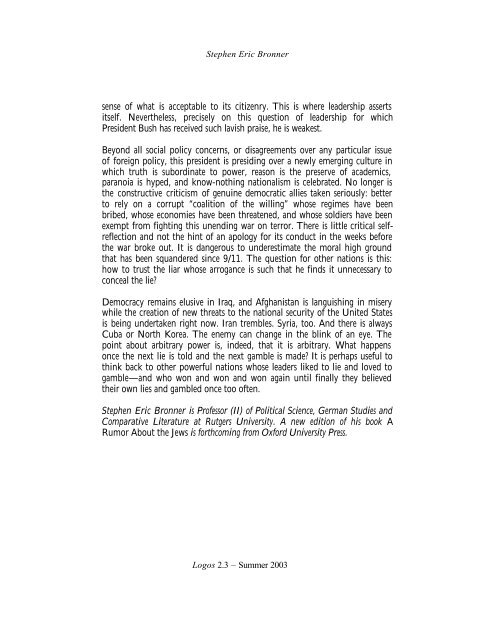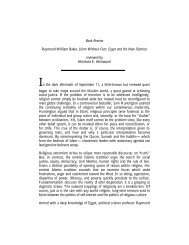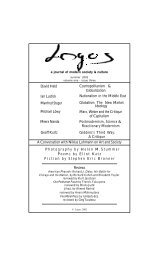Michael J. Thompson Stephen Eric Bronner Wadood Hamad - Logos
Michael J. Thompson Stephen Eric Bronner Wadood Hamad - Logos
Michael J. Thompson Stephen Eric Bronner Wadood Hamad - Logos
Create successful ePaper yourself
Turn your PDF publications into a flip-book with our unique Google optimized e-Paper software.
<strong>Stephen</strong> <strong>Eric</strong> <strong>Bronner</strong><br />
sense of what is acceptable to its citizenry. This is where leadership asserts<br />
itself. Nevertheless, precisely on this question of leadership for which<br />
President Bush has received such lavish praise, he is weakest.<br />
Beyond all social policy concerns, or disagreements over any particular issue<br />
of foreign policy, this president is presiding over a newly emerging culture in<br />
which truth is subordinate to power, reason is the preserve of academics,<br />
paranoia is hyped, and know-nothing nationalism is celebrated. No longer is<br />
the constructive criticism of genuine democratic allies taken seriously: better<br />
to rely on a corrupt “coalition of the willing” whose regimes have been<br />
bribed, whose economies have been threatened, and whose soldiers have been<br />
exempt from fighting this unending war on terror. There is little critical selfreflection<br />
and not the hint of an apology for its conduct in the weeks before<br />
the war broke out. It is dangerous to underestimate the moral high ground<br />
that has been squandered since 9/11. The question for other nations is this:<br />
how to trust the liar whose arrogance is such that he finds it unnecessary to<br />
conceal the lie?<br />
Democracy remains elusive in Iraq, and Afghanistan is languishing in misery<br />
while the creation of new threats to the national security of the United States<br />
is being undertaken right now. Iran trembles. Syria, too. And there is always<br />
Cuba or North Korea. The enemy can change in the blink of an eye. The<br />
point about arbitrary power is, indeed, that it is arbitrary. What happens<br />
once the next lie is told and the next gamble is made? It is perhaps useful to<br />
think back to other powerful nations whose leaders liked to lie and loved to<br />
gamble—and who won and won and won again until finally they believed<br />
their own lies and gambled once too often.<br />
<strong>Stephen</strong> <strong>Eric</strong> <strong>Bronner</strong> is Professor (II) of Political Science, German Studies and<br />
Comparative Literature at Rutgers University. A new edition of his book A<br />
Rumor About the Jews is forthcoming from Oxford University Press.<br />
<strong>Logos</strong> 2.3 – Summer 2003




